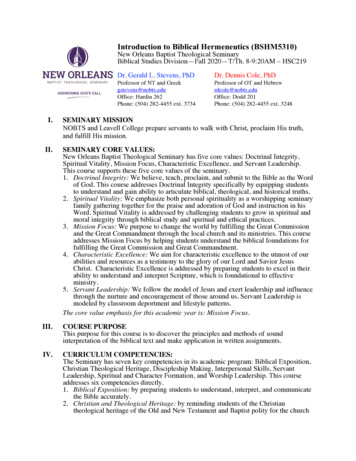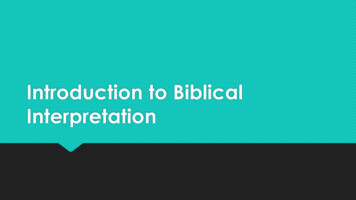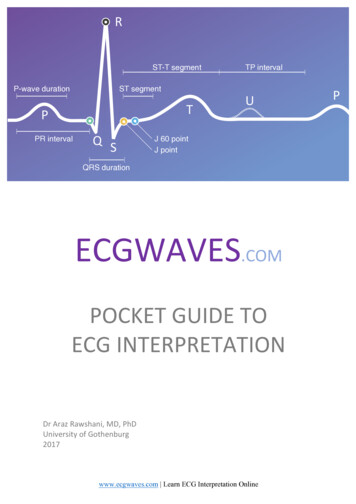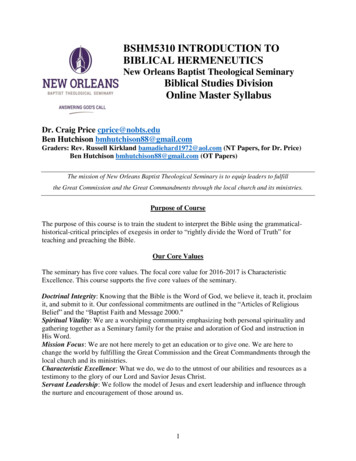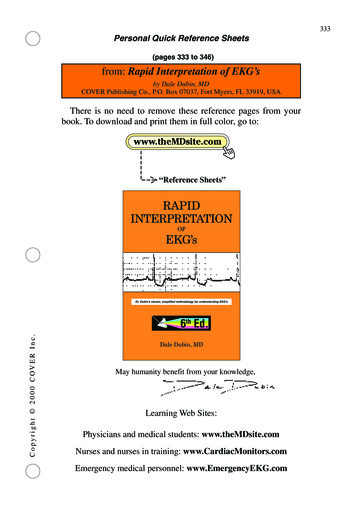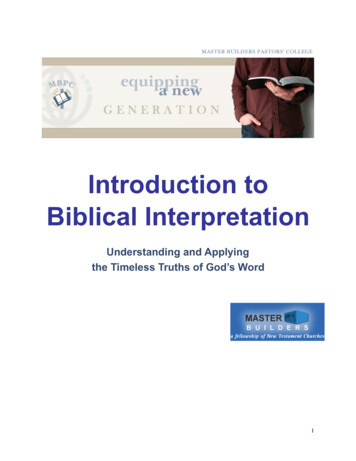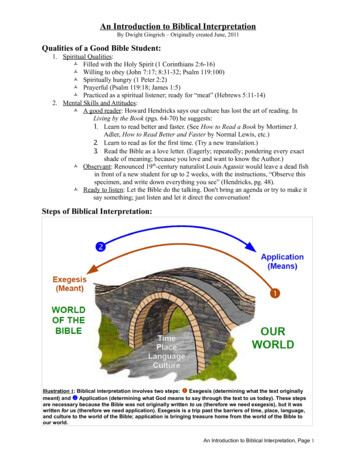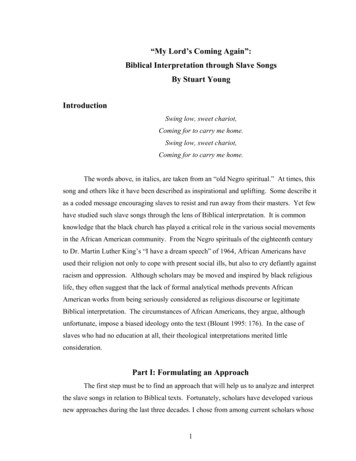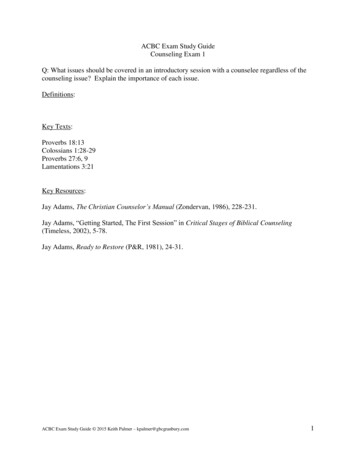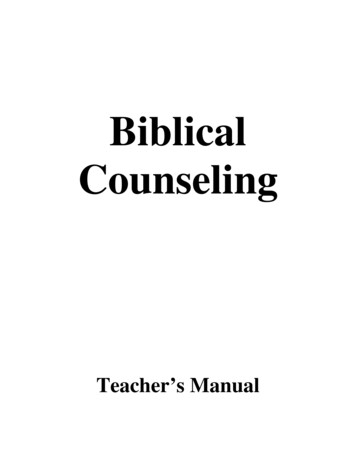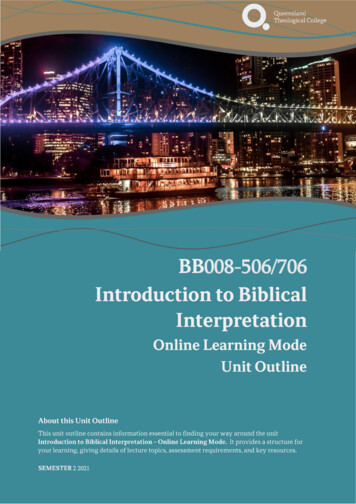
Transcription
INTRODUCTION TO BIBLICAL INTERPRETATION008-506/7062 20211
JESUSAND THE GOSPELS – ONLINE LEARNING MODEBB008-506/706Important noticeWhile every care has been taken to ensure accuracy in the information given below, it is thepersonal responsibility of each student to check the current ACT Handbook, copies ofwhich may be found in the Library or online at www.actheology.edu.auIt is very important that students plan their time carefully to ensure that reading andespecially assignments receive adequate attention and so as to prevent a bottleneck of workat the end of the semester.It is very important that all quoted material in assignments be properly footnoted andacknowledged. The attention of students is drawn to the ACT’s Academic MisconductPolicy, as well as ACT Late Penalties Policy and Extensions Policy, all of which are availableon the ACT website. Failure to comply with the standards required will incur penalties asoutlined in the relevant ACT Policies.The attention of students is also drawn to the section in the current ACT Handbook, headed“Guidelines for Essays in Coursework Units” (see also the QTC Student Handbook). Allessays and assignments should comply with these standards.Students should be aware that the delivery of this unit and results awarded are moderatedby the ACT. See the ACT “Moderation Policy” and “Moderation Procedure” atwww.actheology.edu.au/documents/ for full details.2
INTRODUCTION TO BIBLICAL INTERPRETATIONInformation about this unitUnit description‘Introduction to Biblical Interpretation’ is the foundation of everything we seek to do at QTC.This unit aims to go ‘back to basics’ to ensure that everyone is handling the Bible in a helpfuland responsible way before we throw ourselves into the detail of studying the text in earnest.In this unit, you will be introduced to a way of reading and studying the Bible, which iscoherent, flexible and will shape the way in which you interpret the Bible in every context –whether reading it for personal study or studying the text in order to teach it to others.We will examine in turn the importance of History, Literature and (Biblical) Theology inreading the Bible, before giving some attention to the way in which this will affect how weseek to communicate the message of any text in the context of the flow of the whole Bible.After completing this unit, every student should be equipped to understand how the Biblefits together, how Jesus Christ is the key to all the Scriptures and how to approach the taskof interpreting any part of the Bible.ACT Census Date30 July 2021Students must confirm their enrolment in this unit with the QTC Registrar by Friday 30 July2021. This is the last day on which you may withdraw from the unit without academicpenalty (a Fail), or without being liable for the tuition fees. To make a change in yourenrolment you must contact the QTC Registrar in writing at: registrar@qtc.edu.au.Learning OutcomesBB008-506 Learning OutcomesOn completion of this unit, the student should have achieved the following learningoutcomes:Know and understand1. Demonstrate foundational knowledge and understanding of the biblical writings andmethods of interpretation.Be able to:1. Describe the main genres of the biblical writings.2. Demonstrate skill in applying methods of biblical interpretation.3. Present organised evidence-based perspectives on their biblical writings and theirinterpretationBe in a position to:1. Relate perspectives from ‘Introduction to Biblical Interpretations’ to contemporaryChristian living and ministry contexts.3
JESUSAND THE GOSPELS – ONLINE LEARNING MODEBB008-506/706BB008-706 Learning OutcomesOn completion of this unit, the student should have achieved the following learningoutcomes:Know and understand1. Demonstrate functional knowledge and understanding of the biblical writings andmethods of interpretation.Be able to:1. Discuss the main genres of the biblical writings.2. Explore the relationship of biblical theology to other related disciplines.3. Present critical evidence-based perspectives on their biblical writings and theirinterpretationBe in a position to:1. Apply perspectives from ‘Introduction to Biblical Interpretation’ to contemporaryChristian living and ministry.How this Unit Contributes to the CourseWe are very aware that our students start at very different places – some come to us straightfrom studying another course, whereas others have been in the workplace for years and arepetrified about the challenge of tertiary level study! But we are also mindful of the fact thatour students come from a variety of church backgrounds and have had very differentspiritual journeys. As if that were not all, some of us have (often unconsciously) picked upsome very bad habits over the years when it comes to reading and studying the Bible! That iswhy ‘Introduction to Biblical Interpretation’ is very deliberately set up as a ‘back to basics’unit, in which we strip away our presuppositions and rebuild from the ground up, in order toensure that every student is well-equipped to study ensuing units (and to serve well in thechurch) over the years ahead.BB008-506 is taken by students enrolled in the following accredited courses of the AustralianCollege of Theology: DipMin / DipTh / AssocDegTh / BMin / BThBB008-706 is taken by students enrolled in the following accredited courses of the AustralianCollege of Theology: GradCertDiv / GradDipDiv / MTS / MDivPre-requisites and Co-requisitesThere are no pre-requisites for this unit.Prior to 2020, this unit was content was delivered under the codes RYB31 and RBY51.Unit exclusions: BB006-512, BB006-712.4
INTRODUCTION TO BIBLICAL INTERPRETATIONHow this unit is organised & what we expect of youThis unit is delivered in online mode over 6 weeks with an extra week at the end of theteaching weeks for completing the final assessment. The start date of this unit is 12 July andit will conclude on 3 September, the day the Exegetical Summaries are due. This unit isorganised in terms of learning activities for you to undertake each week.Every week we will look at the topics described in the Unit Timetable, with learning eachweek involving a combination of reading notes provided by the lecturer, listening to audio /watching video material from the lecturer, short readings from relevant books and articles,and short non-assessed exercises to get you thinking about and applying the materiallearnt.Video / audio recordings and reading notes will normally be provided to you in briefsections, to help your learning to be more varied and enjoyable.During most weeks of the unit you will also participate briefly in discussion on the onlineforum for the unit, as indicated in the assessment section of this unit outline: further detailson what is expected regarding online forum contributions will be provided in Week 1 of theSemester.The unit will also involve the completion of two further assessments which are designed notonly to assess your learning, but also to help you to deepen your understanding of the text.This unit is worth 6 credit points towards your degree. A 6cp unit is considered to require anaverage time commitment of around 5 hours per week across all of the teaching andassessment weeks. Please speak with the lecturer as a matter of urgency if you are findingthat you need to consistently spend more time than this on BB008.Students are required to listen to all audios / watch all videos, complete any set pre-readingand complete any assessment tasks by the relevant due date.5
JESUSAND THE GOSPELS – ONLINE LEARNING MODEBB008-506/706Teaching staffLECTURER & UNIT CO-ORDINATORRev Dr Gary MillarP07 3062 6939Egmillar@qtc.edu.auPlease feel free to contact Gary if you have any problems or concerns about the unit.Other Key ContactsRegistrar’s officeContact the Registrar’s office for any queries about which unit to enrol in next, if you wish tochange your enrolment, defer due to illness, family circumstances etc., or request anextension for your assessment (criteria apply).P07 3062 6939Eregistrar@qtc.edu.auMoodle and Turnitin functions and queriesContact the Registrar for help if something on Moodle is not working, if you need help usingMoodle or Turnitin.P07 3062 6939Eregistrar@qtc.edu.auLibrary/ResourcesContact the Librarian for help with finding resources for your assessment, for finding full-textdatabase articles, for help with logging into the library databases and catalogue, to request achapter of a book or article emailed to you, to request a book posted to you, and for helpwith how to renew a book for longer or place a hold on a book currently out to anotherperson. Also contact the library for any queries about audio recordings of your class onMoodle.P07 3062 6939Elibrary@qtc.edu.au6
INTRODUCTION TO BIBLICAL INTERPRETATIONUnit timetable: topics & teaching and learning activitiesWeekLecture TopicWeek 1Learning to Read – why it’s as easy as watching Netflix12 JulyWeek 2You know what I mean? What the text is (and isn’t) saying19 JulyWeek 3King Context (thinking local, historical and biblical)26 JulyWeek 42 AugustWeek 5The Power of Words (and the power of the Word) – why exegesismattersT The Text and the Message – on Theology and Application9 AugustWeek 616 AugustPutting it all together – including dealing with hard passages andhow to spot ‘the real thing’Assessment Weeks: 23 August – 3 September7
JESUSAND THE GOSPELS – ONLINE LEARNING MODEBB008-506/706BB008-506 AssessmentsAssessments are submitted online via Moodle by 11.55pm on the due date (with theexception of timed online quizzes and onsite exams). If you experience difficulty submittingdue to internet issues close to 11.55pm, please email registrar@qtc.edu.au explaining theissue. Attach a copy of your assessment and a screen shot of the folder in which yourdocument is saved to show that you have not made changes after the due time.In order to pass the unit, you must submit all assessment pieces and attain a mark of atleast 50% for the unit as a whole.Unless an extension has been applied for and granted in accordance with the Policy found inthe QTC Handbook, where a student submits an assessment past its due date, in accordancewith the ACT Late Penalties Policy, the assessment marks will be reduced at the rate of 3%of the total possible marks for the assessment item per calendar day, up to 14 days late,after which point the mark awarded shall be zero.Your submitted assessment items must also be within 10% of the required word limit, andfailure to meet this requirement shall result in a penalty of 10% of the total possible markbeing deducted. See the QTC Handbook for full details on what is included within yourtotal word count. Please also note that footnotes in their entirety should not exceed 25%of the prescribed essay length. A 10% penalty of the final grade applies if footnotes aremore than 25% of the prescribed essay length. QTC seeks to prepare you for ministry, and inministry delivering presentations on time and within an acceptable length are essential skills.Assessment TaskDescriptionPre-reading andInitial Online ForumContributionBy Wednesday 21 July, you are required to read the extractsfrom John Piper’s book Think!, which will be available onMoodle. You must post your answer to the question ‘Howdoes Piper challenge us to approach reading the Bible?’,which should reflect on your own experience to date.200 words10% of final gradeDUE: Wednesday 21July 2021Review Essay800 words30% of final gradeNo interaction is expected on these initial posts, but you areexpected to contribute to the forum discussions insubsequent weeks.Write an 800 word review essay assessing the value of DigDeeper (Beynon and Sachs) in learning how to interpret theBible.DUE: Monday 9August 2021Exegetical Summary1200 words60% of final gradeDUE: Friday 3September 2021Using the skills and approaches learned in this unit, write a1200 word exegetical summary on one of the followingpassages:Matthew 5:13-16Acts 3:1-10Romans 15:1-7James 1:19-258
INTRODUCTION TO BIBLICAL INTERPRETATIONBB008-706 AssessmentsAssessments are submitted online via Moodle by 11.55pm on the due date (with theexception of timed online quizzes and onsite exams). If you experience difficulty submittingdue to internet issues close to 11.55pm, please email registrar@qtc.edu.au explaining theissue. Attach a copy of your assessment and a screen shot of the folder in which yourdocument is saved to show that you have not made changes after the due time.In order to pass the unit, you must submit all assessment pieces and attain a mark of atleast 50% for the unit as a whole.Unless an extension has been applied for and granted in accordance with the Policy found inthe QTC Handbook, where a student submits an assessment past its due date, in accordancewith the ACT Late Penalties Policy, the assessment marks will be reduced at the rate of 3%of the total possible marks for the assessment item per calendar day, up to 14 days late,after which point the mark awarded shall be zero.Your submitted assessment items must also be within 10% of the required word limit, andfailure to meet this requirement shall result in a penalty of 10% of the total possible markbeing deducted. See the QTC Handbook for full details on what is included within yourtotal word count. Please also note that footnotes in their entirety should not exceed 25%of the prescribed essay length. A 10% penalty of the final grade applies if footnotes aremore than 25% of the prescribed essay length. QTC seeks to prepare you for ministry, and inministry delivering presentations on time and within an acceptable length are essential skills.Assessment TaskDescriptionPre-reading andOnline ForumContributionBy Wednesday 21 July, you are required to read the extracts fromJohn Piper’s book Think!, which will be available on Moodle. Youmust post your answer to the question ‘How does Piperchallenge us to approach reading the Bible?’, which shouldreflect on your own experience to date.350 words10% of final gradeDUE: Wednesday 21July 2021Review Essay1250 words30% of final gradeNo interaction is expected on these initial posts, but you areexpected to contribute to the forum discussions in subsequentweeks.Write a 1250 word review essay assessing the value of How toRead the Bible for all it’s worth (4th ed.) (Fee and Stuart) inlearning how to interpret the Bible.DUE: Monday 9August 2021ExegeticalSummary9Using the skills and approaches learned in this unit, write a 1500word exegetical summary on one of the following passages:1500 wordsMatthew 12:1-2160% of final gradeActs 12:1-25DUE: Friday 3September 2021Romans 5:1-11James 4:1-10
JESUSAND THE GOSPELS – ONLINE LEARNING MODEBB008-506/706Guide to AssessmentsWhat are we looking for?General remarksAll students are expected to avail themselves of the guidelines for written assignmentsprovided in the ACT Handbook (consult the table of contents) and in the QTC StudentHandbook section ‘Style Requirements for Written Assignments’.All written work for this unit should conform to the guidelines of the SBL Handbook of Style(with the exception of Australian spelling conventions).Any Hebrew and Greek cited must be typed in a Unicode font; SBL BibLit is commended asone font covering Hebrew, Greek, and Roman Unicode ranges, but is not required. It is freelyavailable from the SBL website: http://sbl-site.org/educational/BiblicalFonts SBLBibLit.aspxDo note carefully the number of words required for each assessment item, depending onwhether you are enrolled for BB008-507 or BB08 . For full information on what is included inthe total word count, see the QTC Handbook section headed Length of Assignments.Online Forum ContributionsThe initial post is designed to reflect our various starting points at the beginning of the unit,and will also serve to introduce participants in the unit to one another. Subsequentinteractions will be the result of week-to-week direction and questions which arise.Review EssayThere are two main purposes in the review essay. Please make sure you (a) summarise therelevant content of the book and (b) reflect on how this content should shape our practice.Exegetical Summary Pieces1.It is important to remember that these assessments are designed to test if you havegrasped the basic principles of interpretation (looking at the historical context,appreciating the kind of literature we are reading and how that works, and then how thispart of the Bible fits into the whole flow of Scripture). We are not asking you to come upwith the definitive (or exhaustive) interpretation of any particular Bible passage. Ourconcern is to make sure that you are approaching the Bible properly and are aware of theissues and challenges of interpreting the text, rather than testing your understanding ofany given text per se.2.Students often ask ‘How many other books should I refer to?’ and ‘How many footnotesor references do you want to see?’ The short answer is that for these assessments, theprimary goal is to ensure that you are using the right strategies in interpretation, ratherthan interacting with others who have written on the particular text. The assessments willbe marked on the basis of your method and approach, rather than whether or not youare aware of how others have approached the text in the past. However, it will benecessary for you to refer to books (generally commentaries) for some help on historicaldetails, literary structure and perhaps theological issues. Where you glean help fromthese sources, you should include a footnote, and also add the title to your bibliography.10
INTRODUCTION TO BIBLICAL INTERPRETATION3.In the final session of the unit, you will be shown a couple of representative examples ofwhat we are expecting!Learning ResourcesSet TextsBB008-506 students should purchase:Beynon, Nigel and Andrew Sach, Dig Deeper: Tools to Unearth the Bible’s Treasure.Nottingham: IVP, 2010 [also available as an EBSCO eBook and Perlego eBook accessiblethrough QTC Library]BB008-706 students should purchase:Fee, Gordon D. and Douglas Stuart. How to Read the Bible for All Its’ Worth: A Guide toUnderstanding the Bible. 4rd ed. Grand Rapids: MI: Zondervan, 2014. [also available as anEBSCO eBook and audiobook AND a ProQuest eBook all accessible through QTC Library]Recommended Books for Assessments:Piper, John. Think!: The life of the mind and the love of God. Wheaton, IL: Crossway, 2010.[also available as an EBSCO eBook and audiobook accessible through QTC Library]Other books you might like to refer to on Biblical Interpretation:Klein, W.W., Blomberg, Craig L., and R. L. Hubbard. Introduction to Biblical Interpretation. 3rded. Grand Rapids, MI: Zondervan, 2017. [also available as a Perlego eBook accessible throughQTC Library]Köstenberger, Andreas J. and Richard D. Patterson. An Invitation to Biblical Interpretation:Exploring the Hermeneutical Triad of History, Literature and Theology. Grand Rapids, MI:Kregel, 2011. [This book looks scary, but isn’t! It is also a little expensive, but is really worththe investment; alternatively avail as an EBSCO eBook accessible through QTC Library]Long, V. Philips, M. Silva, Tremper Longman III, Richard A. Muller and Vern S. Poythress.Foundations of Contemporary Interpretation: six volumes in one. Grand Rapids, MI:Zondervan, 1996.Osborne, Grant R. The Hermeneutical Spiral: A Comprehensive Guide to Biblical Interpretation.2nd ed., Downers Grove, IL: IVP Academic, 2006. [available as an EBSCO eBook accessiblethrough QTC Library]Key books on Biblical Theology:Alexander, T. D. and Brian S. Rosner, eds. New Dictionary of Biblical Theology. 1 vol. Leicester:IVP, 2000. [available as a Perlego eBook accessible through QTC Library]Goldsworthy, G.L. Gospel and Kingdom. Exeter: Paternoster, 1981. [available as an EBSCOeBook accessible through QTC Library]Goldsworthy, G. L. Preaching the Whole Bible as Christian Scripture: the application of biblicaltheology to expository preaching. Grand Rapids, MI: Eerdmans, 2000.Goldsworthy, G. L. Christ-centred Biblical Theology: hermeneutical foundations and principles.Nottingham: Apollos, 2012. [available as a Perlego eBook accessible through QTC Library]11
JESUSAND THE GOSPELS – ONLINE LEARNING MODEBB008-506/706Klink, Edward W. and Darian R. Lockett. Understanding Biblical Theology: a comparison oftheory and practice. Grand Rapids, MI: Zondervan, 2012. [available as an EBSCO eBookaccessible through QTC Library]Roberts, Vaughan. God’s Big Picture. Leicester: IVP, 2009. [available as a Perlego eBookaccessible through QTC Library]Biblical Theologies:Gentry, Peter J. and Stephen J. Wellum. Kingdom through Covenant: a biblical-theologicalunderstanding of the covenants. Wheaton, IL: Crossway, 2012. [available as an EBSCO eBookand a Perlego eBook accessible through QTC Library]Hamilton, James M. Jr. God’s Glory in Salvation through Judgment: A Biblical Theology.Wheaton, IL: Crossway, 2010. [available as a Perlego eBook and a ProQuest eBook, accessiblethrough QTC Library]Schreiner, T. The King in his beauty: a Biblical theology of the Old and New Testaments.Grand Rapids, MI: Baker, 2013. [available as an EBSCO eBook and Perlego eBook accessiblethrough QTC Library]JOURNAL ARTICLESIn most of the units you study at QTC, you will be asked to demonstrate your understandingof the subject matter by writing a research paper, essay, take-home exam or the like. Yourlecturers and the Moderators of the Australian College of Theology will expect to see thatyou have consulted current academic research in the form of journal articles.Q:So how do you find good journal articles?A:Search the online Journal DatabasesQTC makes available the following Journal Databases which will be useful for findinginformation for your assessments: ATLASerials Plus – available via EBSCOATLASerials Plus is the full text version of the ATLA Religion Database (ATLA). Thisdatabase is a collection of major religion and theology journals selected by some of themajor religion scholars in the United States. Coverage of this database dates back to1949. Religion and Philosophy CollectionThis database provides extensive full-text coverage of such topics as world religions,major denominations, biblical studies, religious history, epistemology, politicalphilosophy, and philosophy of language, moral philosophy and the history of philosophy. JSTORJSTOR provides full-text access to journal articles as well as eBooks. It includestheological journal titles such as the Harvard Theological Review and other titles notfound in ATLASerials Plus or the Religion and Philosophy Collection.Most journal articles will be available as a PDF which you can read, print or save.12
INTRODUCTION TO BIBLICAL INTERPRETATIONAccess the databases via the QTC Library ibrary/databases/and login with the username and password provided on Moodle under the QTC Library unit.13
OLD TESTAMENTTOINTRODUCTIONFOUNDATIONSBIBLICAL INTERPRETATIONACT Standards: GradesGrades in assessment instruments are awarded in the following categoriesGradeScoreGPAFail (F)0-49%0Pass (P)50-57%1Pass (P )58-64%1.5Credit (C)65-74%2Distinction (D)75-84%3High Distinction (HD)85 %414
‘Introduction to Biblical Interpretation’ is the foundation of everything we seek to do at QTC. This unit aims to go ‘back to basics’ to ensure that everyone is handling the Bible in a helpful and responsible way before we throw o

